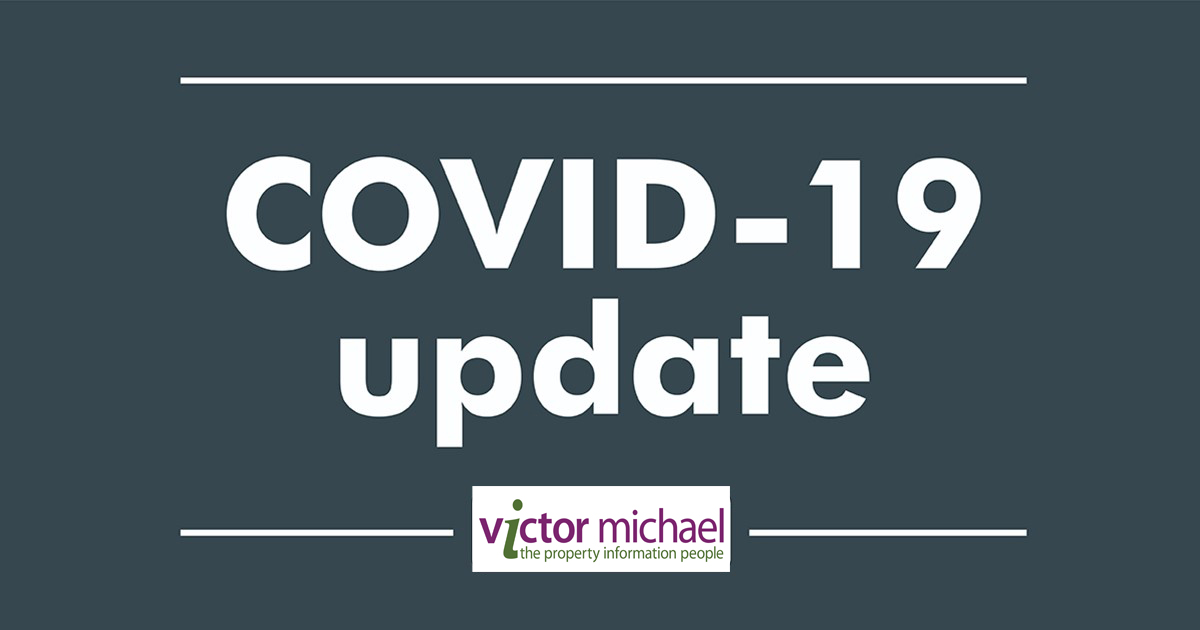Enter Your Address and Get Your Home Report!
Happy Easter from everyone at Victor Michael Estate Agents!
May the miracle of Easter brighten your life with love, happiness and joy.

How to Find the Right Tenant for Your Property
If you’re thinking of becoming a landlord, finding the right tenant for your property is crucial. Here are our top 10 tips to find the right tenant for you.
1. Make sure your property is in top condition
No tenant wants to move into a run-down property, nor are they likely to want to request a bunch of repairs as soon as they move in. Make sure you give the walls, doors and window frames a fresh lick of paint, attend to any necessary repairs, and ensure the home, if furnished, is appealing to the masses. Neutral décor tends to be the most coveted aesthetic, particularly in rental homes.
2. Marketing your property
You’re going to want to ensure your chosen estate agent has an extensive marketing strategy to ensure your property is visible to a wide audience, particularly online. Competition is tough, particularly when it comes to lettings, so good quality photography, videography and written descriptions are a must.
3. Background checks
Once you’ve received interest on your property, you’re going to want to ensure you perform the necessary background checks. Your screening process must be the same for every applicant, as it is against the law to discriminate against anyone due to gender, race, sexuality or religion.
4. Reference checks
All tenants should be able to supply a reference from a previous landlord upon moving into the property. If they have never rented before, you can ask for a character reference.
5. Consider pets
Particularly since the pandemic, more people are looking to rent with pets. Allowing pets will boost interest in your property and open up the opportunity for a more long-term let as those with pets are less likely to move as quickly and are more likely to settle in a property for longer.

6. Right to rent checks
You must check whether any prospective tenant over the age of 18 has the right to live in the UK before agreeing on a tenancy. Learn more about right to rent checks.
7. Ensure the tenant can afford to pay rent
Their monthly income should ideally be three times the cost of the rent. However, if you’re based in a major city like London, that can sometimes be unrealistic. So, ensure they’re employed, ask for copies of their payslips and enquire about the length of their employment. If they are unemployed or earn less than required to guarantee that rent will easily be paid in a timely manner, request a guarantor to take responsibility for the individual should they fail to honour their contract. If they don’t have a full-time job but can afford the property through other means such as savings, you can request that they pay six months’ rent upfront.
8. Credit checks
Performing a credit check will highlight any outstanding debts or loans they may have, as well as any missed or late payments. This will help you decide whether the individual is a suitable and reliable tenant.
9. Meet your tenants
It is likely your estate agent will advise against your being present at viewings, however, it’s important that you trust your agent to advise you on whether or not the tenant is a good fit and comes across as reliable, mature and honest. If you are unsure, it’s worth meeting the tenant where possible to get an idea for yourself before committing to a tenancy agreement.
10. Communication is key
You’ll want to establish an efficient method of communication with your tenant, should anything go wrong, such as issues with the property. Whether you prefer email or WhatsApp, find the right method that works best for you and make sure to encourage them to contact you should any repairs be required, or if they have any questions regarding the property. Establishing a good relationship at the start of the tenancy is a great way to avoid larger issues further down the line.
Contact us today here: www.victormichael.com
Source: www.guildproperty.co.uk
Property industry warned of “major culture changes to come” in wake of National Trading Standards announcement.
National Trading Standards has this week announced that by the end of May 2022 all property listings will need to contain the property’s council tax band or rate and the property price and tenure information (for sales), in a new effort to improve the availability of upfront information in the conveyancing process.

In a move generally welcomed by the industry, the announcement is in line with the government’s Levelling Up White Paper which spoke of “ensuring the critical material information buyers need to know…is available digitally wherever possible from trusted and authenticated sources, and provided only once”.
The changes represent the first phase of a three-phase project by the National Trading Standards Estate and Letting Agency Team (NTSELAT), in partnership with industry leaders and the UK’s major property portal- and define what constitutes material information for property listings.
Two further phases are being developed, which will incorporate further material information such as restrictive covenants, flood risk and other specific factors that may impact certain properties.
As the new data fields for tenure, price and council tax are added to portals, those left empty by an agent will be flagged on the listing so that consumers can see what is missing. This will link to advice on why that information is important and how it may be obtained.
National Trading Standards wants all material information to be mandatory on property listings once all three phases of the project are complete. At that stage, agents will need to include all the required information before it is listed on a property portal.
In addition to the announcement by the NTS, The Competition and Markets Authority (CMA) has also been working to improve how the leasehold market works for consumers. It is investigating and has acted against potential breaches of consumer protection law in the leasehold housing market, including unfair contract terms in leases as well as broader allegations of mis-selling of leasehold property. The CMA has also stressed the importance of people being fully aware of the annual costs of owning a home before they buy, and that clearer upfront information is needed when properties are sold.
Source: www.propertyreporter.co.uk
House price growth likely to be curbed by supply boost next spring
Despite rising inflation and the end of both the furlough scheme and stamp duty holiday, UK house price growth continues to deny economic gravity as we head into the festive period. However, what goes up must surely come down – eventually.

The latest market analysis from Estate Agents show that a combination of rising interest rates and a much-needed increase in housing supply are the likely culprits to end the seemingly never-ending streak of stronger than usual house price growth.
Nationwide reported that the average UK price exceeded £250,000 in October for the first time. Indeed, new analysis shows the total value of the housing stock in England and Wales was £7.68 trillion in July 2021, which was an uplift of £720 billion from March 2020, when the total value was £6.96 trillion. The study, which puts a number on the total value of all private housing, factors in exchange prices as well as changes to house prices. A higher overall figure can reflect a larger number of households in a given local authority as well as higher-value properties.
The combined housing stock in the top ten local authorities by value also broke through the trillion-pound barrier over the course of the pandemic, rising to £1.007 trillion from £978 billion. However, there were not increases everywhere.
The highest total in July this year was £157.8 billion in the central London borough of Westminster, which was down by 10.1% from March 2020. The decline was the highest in England and Wales but is understandable given the area’s high proportion of flats and the fact fewer international buyers were able to travel to the UK.
However, it was one of only three local authorities in England and Wales that saw the value of its housing stock fall over the period, together with Lambeth (-2.2%) and Wandsworth (-1.1%).
There were other interesting changes in the top ten most valuable areas over the course of the pandemic. Cornwall leapfrogged Richmond-Upon-Thames into eighth place while Leeds replaced Ealing at number ten. Both changes can be explained by the growing demand for space and we have previously explored how Yorkshire, in particular, has benefitted from this trend.
The top three largest increases over the period were all in northwest England: Rossendale (24.2%), Wirral (21.6%) and Liverpool (21.6%).
Two things will curtail this strong level of growth. The first is rising interest rates. Last week, the Bank of England held the base rate at 0.1% but a rise is clearly coming.
However, it would be wrong to overstate the short-term impact on the UK housing market. Rates were 0.75% before Covid struck and any effect is likely to be limited while rates remain below this level. What’s different between now and early 2020 is the presence of inflationary pressures, which may cause demand to start fraying around the edges depending on how elastic the definition of “transitory” becomes. Longer-term, there will need to be a readjustment as rates normalise, a process that has been delayed by the pandemic.
Over 3.5 million first-time buyer mortgages have been issued since the base rate dropped to 0.5% in March 2009. That is a large group of homeowners who don’t know what it’s like when interest payments rise meaningfully.
The other thing to watch closely is supply, which will put downwards pressure on prices as it increases. The housing market is famously seasonal, so can we tell yet what is likely to happen next spring?
Source: www.propertyreporter.co.uk
September stamp duty holiday deadline still enticing landlords to buy
The stamp duty holiday deadline ended on 30 June but buyers have until 30 September to take advantage of the lower stamp duty holiday threshold of £250,000. Landlords will be able to save up to £2,500 although they still have to pay the 3% stamp duty surcharge for owning more than one property.
YOU CAN STILL BENEFIT FROM THE STAMP DUTY HOLIDAY
First Time Buyers now pay less or no tax if all purchasers are First Time Buyers and the purchase price of the property is £500,000 or less.
Since 1st July 2021, the current Stamp Duty Land Tax (SDLT) threshold has gone down to £250,000. Although the bigger savings before this date have now been reduced, there is still an opportunity to save up to £2,500 on SDLT before it returns to its regular threshold rate of £125,000 from 1st October 2021.
What has gone unnoticed by most commentators is the change that affects First Time Buyers, which also came into effect from 1st July. Since that date, First Time Buyers now pay less or no tax if all purchasers are First Time Buyers and the purchase price of the property is £500,000 or less.
First Time Buyers are exempt from SDLT for the first £300,000, but since 1st July, they now pay a reduced rate of 5% on purchase prices above £300,000 and up to, and including, £500,000. So, if you’re a First Time Buyer, but were unfortunate to miss out on the 30th June deadline, there are still longer-term savings to be made, as these will continue for First Time Buyers after the SDLT returns to its £125,000 threshold from 1st October 2021 for all other buyers.
URGENT INFORMATION REGARDING YOUR TENANCY

Further to the Government’s announcement yesterday evening, and the clear instruction on all non-essential businesses to be closed, we will be closing our offices to the general public until further notice.
However, we will continue to be available to assist and manage emergency related issues. We will still be available via email on management@victormichael.com/ accounts@victormichael.com
This has become a necessity to protect our clients, staff and contractors.
For those facing financial difficulties, have contracted Covid-19, are self-isolating or are self-employed, the Government has released advice on what you can do to get financial assistance, please visit https://www.gov.uk/government/publications/support-for-those-affected-by-covid-19/support-for-those-affected-by-covid-19
If your tenant has been layed or has been informed that they have been let go due to the above, we have asked them to provide written proof of the same.
However, the Government has prepared a ‘wage package’ called the ’Coronavirus Job Retention Scheme’, where:
“…all UK employers will be able to access support to continue paying part of their employees’ salary for those employees that would otherwise have been laid off during this crisis.”
We have urged Tenants to should speak to their employers about this to see whether it would apply to them.
In the meantime, the following extract details specifically tenants and Landlords:
If you are experiencing financial difficulties meeting your mortgage repayments because of COVID-19, you may be entitled to a mortgage or rental holiday for 3 months. This includes if you are a landlord whose tenants are experiencing financial difficulties because of COVID-19. If you are a tenant experiencing financial difficulties because of COVID-19, the government will ensure you do not face the threat of eviction for at least 3 months:
- the government has agreed with mortgage lenders that they will offer repayment holidays of 3 months to households in financial difficulty due to COVID-19
- this will also apply to landlords whose tenants are experiencing financial difficulties because of COVID-19
- emergency legislation will be taken forward so that landlords will not be able to start proceedings to evict tenants for at least a 3 month period. This applies to private and social renters
- at the end of this period, landlords and tenants will be expected to work together to establish an affordable repayment plan, taking into account tenants’ individual circumstances
Essentially this means that, during the next 3 months, tenants who have difficulty in paying their rent, will be ‘protected’ from being evicted, however, this does not mean that rents are not due/waived, but deferred/delayed.
During the next 3 months, it is recommended that rents is paid as much as possible, after which both sides are expected to agree affordable payment plans to clear arrears and cover future rental amounts due.
We have been in discussions with HomeLet, our Rent Guarantee provider, who has confirmed to us that, at present, they will meet their obligations with existing policies but we would need to make you aware that the policy contains a clause regarding ‘Force Majeure’, which they may decide to enact
‘Force Majeure’ means “unforeseeable circumstances that prevent someone from fulfilling a contract”.
However, please note that any legal action will the subject to the above ‘protection’ for those who have been directly affected by Covid-19.
Separately, they have informed us that they are not accepting any new applications, until further notice.
Questions to ask your conveyancing solicitor before you instruct
It’s important to ask potential conveyancing solicitors the right questions, to ensure your purchase goes as smoothly and quickly as possible.

Conveyancers are an important part of the homebuying process. A good conveyancing solicitor can help things run smoothly, but this largely depends on who you choose to work with and what service you get from them. And the only way to find that out is by asking the right questions before you instruct them.
1. How much will you charge?
Yes it’s a pretty obvious one but you’d be surprised how many people fail to ask this at the start of the conveyancing process. It’s important to get quotes from a few different conveyancers to ensure you’re getting a good deal.
Most conveyancing quotes will include third party costs (or disbursements) such as the cost of local authority searches and Stamp Duty. If a quote seems surprisingly low, it could be that third party costs aren’t included in the conveyancing fees. Ask for an itemised quote so you can see what the conveyancer’s time actually costs.
2. Who will handle my case?
The most experienced solicitor in the firm may give you the quote, but often you’ll find it’s the junior team member who actually works on your case. That’s not necessarily a bad thing. For straightforward sales the conveyancing process should be pretty standard and nothing a newly qualified solicitor couldn’t handle.
However, it’s important to know who is working on your case so that you can build a relationship with them and, in the event you run into issues and need to speak to someone for clarification or a concern. If your case is a little more complex (for example, buying a leasehold property where you will want to discuss restrictions and costs associated with being a leaseholder), you may prefer a more experienced solicitor. Ask for the name of the person that you will be speaking to in that instance.
3. How often will I hear from you?
Trust us, there is nothing worse than radio silence when you’re in the house buying process. You’re on tenterhooks, desperate for everything to go ahead as planned and your solicitor has suddenly gone to ground. No updates, no calls. Frustrating is an understatement. At the same time, you don’t want to be calling everyday when they are trying to progress your case.
You can avoid this frustration by having a frank discussion with your conveyancer at the start of the process about what level of communication is reasonable and when you can expect to hear from them.
4. Which bodies are you a member of?
Conveyancing solicitors should be members of professional bodies such as the Law Society and the Council of Licensed Conveyancers. Check which professional body they’re a member of before appointing them.
5. Have you dealt with many cases like mine?
Not all home sales are the same. Yes, there’s the run of the mill, three bedroom 1930s semi but there’s also a host of factors that can make things a little more complicated. And if your conveyancer isn’t accustomed to cases like yours, it could hold the whole process up and mean you aren’t getting the level of service you need. If you’re buying a leasehold or buying a new build home, for example, you’ll be much better off opting for a solicitor who has dealt with similar properties before.
6. What costs will I have to pay if the sale falls through?
It’s important to ask your conveyancing solicitor how much you’d need to pay if the sale falls through. It is possible to find firms that offer ‘no move, no fee’, but you should double check what that means in reality. For example, does it mean that you still need to pay third party costs? Do you need to pay for an insurance policy to be eligible for this, and if so how much will the premiums be?
It’s common for disbursements (the cost of searches and out-of-pocket expenses incurred by the firm) to be excluded from most ‘no sale no fee’ quotes. However, if you’re unsure whether to progress with a a purchase – for example if you are still finalising your financing, or waiting for survey results – you can always instruct the lawyers but ask them not to incur any expenses yet, and to hold off on any searches. That way, if the purchase doesn’t progress, you shouldn’t be out of pocket – at least with regards to the law firm.
7. Are you approved by my mortgage lender?
Many mortgage lenders will only work with conveyancing solicitors that are on their approved panel, but most conveyancing referral services will ask this upfront so you don’t end up with a conveyancing solicitor that your lender rejects.
You can still choose to work with a firm that isn’t approved, but you’ll need to pay extra and the costs can pile up.
8. Where can I check feedback?
There is no better way to check a firm’s performance than by reading reviews. If your chosen firm is proud of its track record it’ll have no problem directing you to where you can find feedback from past clients.
9. When do I need to pay conveyancing fees?
It’s important to check when you’ll be expected to pay the conveyancing bill. It could be that you need to pay when you exchange, or when you complete. You may be asked to pay a deposit at the start, and you may need to settle the bill for disbursements as they come up. In short, this varies by firm so make sure you find out when payment is due.
10. What’s your procedure for disputes?
It’s always a good idea to prepare for the worst case scenario, so asking how the firm deals with disputes is very important. Aside from giving you a feel for their level of customer service, it’ll arm you with invaluable knowledge if you do need to raise an issue. If a firm doesn’t have a solid procedure, or if the conveyancing solicitor is unsure of what to do in this situation, it should raise a red flag.
Source: www.hoa.org.uk





